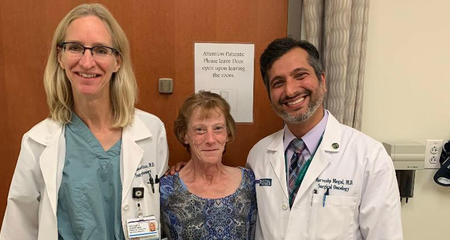Desmoplastic small round cell tumors (DSRCT) are a very rare type of soft tissue sarcoma. This cancer usually affects children and young adults, and it is more common in males.
DSRCT most often begins in the tissue lining the inside of the abdominal cavity, which is also known as the peritoneum. However, there have been reports of this malignancy arising in other parts of the body. DSRCT can spread from the peritoneum to other organs, most commonly the liver and lungs.
Diagnosing DSRCT
Symptoms of DSRCT can include abdominal pain, cramps, abdominal distention, a feeling of fullness and constipation. Patients often present with an abdominal mass.
Patients typically receive imaging studies, including computed tomography (CT) and magnetic resonance imaging (MRI). Definitive diagnosis of DSRCT requires a tissue sample, which can be obtained either through a minimally invasive biopsy procedure or during surgery. Obtaining a tissue biopsy enables pathologists to identify the specific genetic change that is unique to DSRCT. This genetic mutation is not inherited, but is acquired during the individual’s lifetime.
DSRCT Treatment
At the time of diagnosis, most patients with DSRCT have widespread disease. Because tumor tissue is dispersed throughout the abdominal cavity and often the pelvic cavity, surgical removal alone is inadequate. Patients typically receive a multidisciplinary treatment plant that involves chemotherapy, surgery and radiation therapy. In addition, some patients might benefit from stem cell transplantation through the Blood and Marrow Transplant and Cellular Therapy Program.
Patients with DSRCT may also be eligible for HIPEC, a newer treatment approach that blends cancer surgery with cancer drug therapy. This therapy is delivered during a two-step procedure. First, surgeons remove as much DSRCT tissue as possible from affected areas. Second, the surgical team circulates a heated chemotherapy solution within the abdominal cavity, enabling direct contact between the remaining cancer cells and the anti-cancer drug.
Virtual Visits Are Available
Safe and convenient virtual visits by video let you get the care you need via a mobile device, tablet or computer wherever you are. We’ll gather your medical records for you and get our experts’ input so we can offer treatment options without an in-person visit. To schedule a virtual visit, call 1-866-680-0505.
More to Explore





